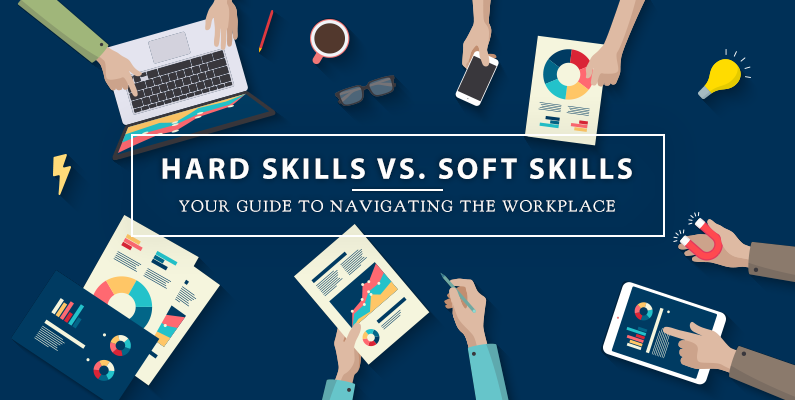Hard Skills vs. Soft Skills: Your Guide to Navigating the Workplace
| 4 Min Read

When it comes to careers in the business world, much emphasis is placed on mastering hard skills. However, developing soft skills is also a key component of success. During the hiring process, employers and human resources teams look for applicants who balance both hard and soft skills because these well-rounded candidates are valuable in a variety of positions. But what are hard and soft skills, and what impact do they have in the workplace?
Hard skills are “teachable abilities or skill sets that are easy to quantify,” according to The Balance. These skill sets are often featured on cover letters and resumes so that they are easily recognizable to recruiters. Soft skills, on the other hand, are more subjective. Also known as “people skills,” they refer to how an individual interacts with others, The Balance explains.
Hard Skills vs. Soft Skills
While hard skills can be taught through training and professional development, it’s much more difficult to teach someone soft skills. Think of it this way: A candidate can easily use tutorials to learn a computer program that is new to them, but developing skills like teamwork and time management is a more complex process. That’s why more and more employers are seeking out candidates with a combination of both skill sets. If a professional can already demonstrate valuable soft skills, employers can make use of their potential for ongoing success.
There are a few key differences between hard and soft skills. The first is related to types of intelligence. In general, soft skills require emotional intelligence (EQ), while hard skills are more based in assessments such as the intelligence quotient (IQ).
EQ is “the ability to identify, assess, and control the emotions of oneself, of others, and of groups,” according to Diffen. Examples of EQ include collaboration and initiative. Conversely, IQ is derived from standardized testing and grades. It usually refers to the ability to “learn, understand and apply information to skills, logical reasoning, word comprehension, math skills, abstract and spatial thinking” and more, Diffen continues. Hard skills are important when it comes to analysis, research and development.
Another difference between hard and soft skills is in how each skill set is developed. Hard skills are typically learned via coursework or training, while soft skills tend to be more innate or developed indirectly through experience. Finally, hard skills vary by industry and profession: An accountant relies on different soft skills than a marketing manager would, for example. Soft skills are more general and can be utilized across many fields.
Hard Skills
- Project management: Project management skills enable business professionals to manage a team and execute projects effectively. Being able to navigate complex projects is a cornerstone of leadership and can make the difference between failure and success.
- Technology management: Because technology is such a driving force in the business world, navigating the various tech components of a business is an invaluable hard skill. Understanding the connection between business and technology is one of the best ways to advance in your career.
- Information analytics: Information analytics can increase productivity and drive businesses, helping them to stay competitive. Utilizing this skill set helps businesses understand consumer behavior.
Soft Skills
- Interpersonal communication: According to a GMAT survey of employers, communication skills are among the most in-demand for new hires. “Communications, teamwork, and interpersonal skills are critical—everything we do involves working with other people,” one employer said.
- Leadership: Successful managers and others in advanced positions need to be able to lead their employees while motivating them to perform at a high level. “A good leader will inspire those who work with them and around them, make them feel valued and give the whole undertaking a sense of direction,” Top MBA says.
- Decision-making: Being able to think strategically and make tough decisions is one of the core skills business leaders need.
Skill Development Through MBA Coursework
Both hard and soft skills can help professionals stand out from the competition and gain ongoing career success. Earning a Master of Business Administration (MBA) is a smart way to hone both skill sets. Concordia University, St. Paul’s fully online MBA balances coursework in core business topic areas like finance and accounting with hands-on projects and research that help students develop strong soft skills.
If you are interested in advanced business topics like these, consider Concordia University, St. Paul’s online MBA program. You can also download our free guide, “Climbing the Corporate Ladder: Your Guide to the MBA and Beyond,” for an in-depth look at the value of the MBA.